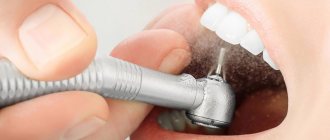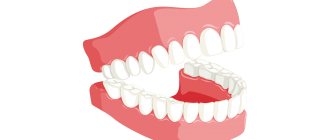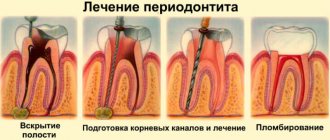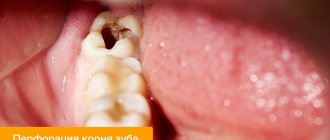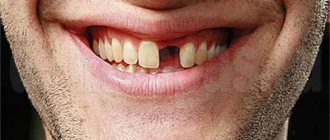What to do if the only issue is money
If the reason for refusing treatment is only its high cost, then every citizen of the Russian Federation can receive many types of dental care under the compulsory medical insurance policy in a state clinic.
Yes, in the clinic the doctor does not have enough time for each patient, perhaps there are not the most advanced dental materials and the best treatment methods available today. The clinic doctor cannot observe every patient, so the regularity of visits will have to be planned independently. And the peculiarity of interaction between doctors of different specializations in a clinic, as a rule, does not imply an integrated approach to dental treatment.
But all of the above is not an obstacle to curing caries under the compulsory medical insurance policy.
Caries, cured on time , will save money, time and nerves, which otherwise would later have to be spent on more expensive treatment of its complications.
According to the World Health Organization in 2012: “Globally, 60-90% of school-aged children and almost 100% of adults have dental caries, which often leads to pain and discomfort.”
In dental treatment, the main thing is not to put it off for years, citing various reasons, because they will always be found for not going to see a doctor.
Taking care of your health requires internal discipline and I would like to recall a hackneyed but absolutely fair idea: disease prevention is cheaper than treatment .
How to remove a tooth
There are two extraction methods used in dentistry: simple and complex. Their choice depends on which teeth are being removed - premolars and molars with tangled branched roots are removed using a complex method. It is very difficult to pull out such elements entirely due to the fact that the tooth socket is penetrated by retaining ligaments and alveolar processes. Errors during the procedure or insufficient experience of the specialist lead to serious complications. Therefore, even despite the acute condition, always find out in advance where you can have a tooth removed from a good doctor with positive recommendations.
Factors complicating the operation:
- complete destruction of the coronal part;
- high fragility;
- acute inflammatory diseases;
- Unerupted or misaligned wisdom teeth.
The technology of the procedure depends on which teeth are removed. In some cases, tissue incision and suturing are performed.
Whether it is painful to remove a tooth or not depends largely on the condition of the element. Anesthesia is performed in all cases, with the exception of severe allergic reactions to all types of painkillers. With the development of extensive purulent lesions, the effect of the drug may be reduced.
How long it takes to remove a tooth depends on the complexity of the operation. On average, this takes no more than 5-10 minutes (including waiting for the anesthesia to take effect). In general, the procedure includes the following steps:
- anesthesia;
- if necessary, an incision is made into the mucous membrane to access the cervical area, or the doctor lowers the gum with an instrument;
- Use forceps to fix the tooth at the lowest point without excessive pressure;
- rocking and extraction from the hole is performed;
- returning the gum flap to its place.
If inflammatory processes are diagnosed in the oral cavity, a course of antibiotics is prescribed. In some cases, extraction is performed under general anesthesia.
In case of multiple lesions, the doctor determines how many teeth can be removed in your case during one visit, but more often it is 1–2 elements. This is because extraction is a traumatic operation that will take time to recover from. Too large areas of damage increase the likelihood of complications several times and take much longer to heal.
If after surgery the extracted tooth, or rather the hole left after it, hurts, this is a reason to consult a doctor. After the procedure, minor pain is allowed during the first 24 hours. Visit the dentist if your temperature rises, swelling increases, bleeding occurs, or pain spreads to the lymph nodes. These are symptoms of a wound infection. Untimely treatment can lead to alveolitis.
How does private medicine differ from public medicine?
We figured out that with limited financial resources, the issue of high cost of dental treatment can be resolved by contacting a state dental clinic under the compulsory medical insurance policy.
But if you want to feel more concerned about your health, undergo diagnostics and treatment using modern equipment, technologies and materials, then you need to go to a private dental clinic.
Commercial medicine is created for patients who are more demanding of their health and quality of life.
Doctors at private clinics are ready to devote as much time as necessary to their patients to provide highly qualified medical care, so they always offer a comprehensive approach to dental prevention and treatment.
What is the cost of treatment?
Many people believe that dental treatment is expensive. And we are also sure that the cost announced in the clinic is what ultimately ends up in the dentist’s pocket. However, the money that each patient pays is divided into many components:
- directly medications and materials that are used during your treatment depending on the clinical situation: for example, filling materials, anesthesia, kneading pastes and gutta-percha pins, implant models and components for them. It should be noted that private dentistry often uses higher quality imported materials, the price of which depends on the dollar or euro exchange rate,
- consumables and disposable work equipment: gloves, masks, syringe needles, cotton wool, cups, rinsing solutions, saliva ejector tips,
- the work of the clinic staff: primarily the attending physician, but also his assistant, administrator, cleaner, sterilizer,
- renting premises and providing utilities,
- equipment: experts say that just a good dental chair for a patient costs as much as a car. Also, for high-quality diagnostics and treatment, the clinic must have a tomograph, a polymerizer, a drill, a microscope and other equipment. Many equipment is purchased on lease or on credit, which must be paid for,
- advanced training of a doctor: everyone wants such complex manipulations as prosthetics and dental implantation, for example, to be carried out in 1 day. And also, so that the treatment is safe and carried out by professionals who are aware of the latest innovations and technologies in this field,
- licensing and certification.
How does an integrated approach differ from solving obvious problems?
Let's take a break from dentistry and imagine that you are going on a long trip by car. You are going on vacation.
Proper preparation of the car for travel means diagnostics at a service center and elimination of all detected faults, as well as potential problems that may manifest themselves during a long trip.
Sometimes we doubt: does the problem really exist or do they just want to make extra money off of me? But this is just a matter of trust in specialists and you will trust them if you periodically ask for help and are satisfied with the cooperation.
As for the trip, if you convince yourself that there is no point in spending money on something that hasn’t broken yet , then a breakdown on the road can ruin your vacation.
Removable prosthetics
A removable denture is recommended when several units are removed or when the entire jaw is missing. For a single replacement, doctors recommend a temporary option - an immediate prosthesis, which is placed in place of the removed incisor or canine to preserve aesthetics. Then the product is replaced with a permanent and more convenient to wear option.
For removable prosthetics of one tooth, a high-quality impression of the jaw is required, which is made 3-4 days after the extraction operation. To make extended structures for several teeth, doctors recommend waiting until the tissue is completely restored. It takes about 30 days for the gums to heal before prosthetics.
An example of dubious savings in the case of tooth extraction without taking into account future plans
If a diseased tooth cannot be saved and, for medical reasons, it needs to be removed, then from the patient’s point of view, the cheapest option is to complete the treatment by removing it and go home, forgetting about the problem tooth.
But if you do not agree with the doctor on the further prosthetic plan, then in the place of the lost tooth, the process of resorption of bone tissue will begin, and the neighboring teeth and the antagonist tooth will begin to move.
Here's what the process looks like.
What does losing just one tooth lead to?
Perhaps after some time the patient will remember that the doctor offered to restore the tooth with a crown on an implant and will be ready for such treatment, but time has passed and it will no longer be possible to perform prosthetics without paying for additional treatment.
In place of the missing tooth there is a process of bone tissue atrophy
Due to tooth displacement and bone loss, installing an implant will require restoring the correct position of adjacent teeth (orthodontic treatment) and building up bone tissue (surgery).
Now you know that if it is not “wisdom teeth” that are removed, without which, as a rule, it is only better, you must definitely ask: “Doctor, what will we do next?”
Our second example is that there is no need to rush to remove a tooth if there is a chance to save it.
Why is dental implantation so expensive and what affects the price?
Professional doctors say that implantation cannot be cheap. Do not forget that treatment in this case is not limited only to the installation of implants. This is a whole complex of procedures that requires a high level of preparation and the elimination of the slightest risks.
Let's look at what affects the price of implantation, and you will understand why dental implantation is expensive:
- preparation: it includes sanitation of the oral cavity, removal of decayed teeth and professional hygiene to eliminate the risk of infection of the operated tissues and rejection of implants. At the preparatory stage, the patient needs to undergo tests and have a computed tomography scan, and the doctor needs to work out a treatment plan in a special computer program,
- Additional treatments: You may need additional treatment for tooth decay or anti-inflammatory gum therapy. A number of patients have an acute deficiency of bone tissue, so bone grafting or sinus lift is required before implantation,
- anesthesia: as a rule, local anesthesia is included in the cost of the operation, but some patients, according to indications, require sedation or anesthesia, for which you will have to pay separately,
- implant model: high-quality brands tested by many clinical studies (for example, Nobel and Straumann) cannot be cheap, as they have unique features, the highest survival rate and biocompatibility with the body, reduce the time of engraftment in the jaw bone, and are suitable for the most complex clinical cases (with diabetes and periodontitis, with a lack of bone tissue). But on Israeli and Korean models you can save a little, but they consist of titanium with impurities that slow down the engraftment process, and are suitable for a limited number of clinical cases,
- components for implants: abutments, gum formers. To ensure that implants and prostheses do not fail after installation, the components must be original, that is, from the same manufacturer as the implants themselves,
- implantation method: for example, with classic two-stage implantation, you will have to visit the doctor many times and split the stages of implant installation and prosthetics over time. The two-stage protocol places strict demands on the quality of bone tissue, which means that in most cases it has to be augmented. If the patient prefers one-stage methods, then the number of visits to the doctor is reduced to a minimum, costly bone grafting can be avoided, and fixed dentures can be placed in 3 days,
- prosthetics: the type of prosthesis (removable and fixed), the number of artificial crowns and the material from which they will be made are taken into account,
- use of innovative tools and equipment: for example, 3D scanners, CAD/CAM technologies. This is expensive equipment that dentists take out on lease or credit, and working on it also affects the price,
- payment for staff work: to make quality teeth, you need the participation of at least 4 specialists (dentist therapist, implantologist, orthopedist, dental technician). Also, do not forget that the price also includes the activities of other employees (clinic administrators, managers, assistants).
Complex endodontics and tooth-preserving operations
We have just discussed that after tooth extraction, it is best to immediately schedule implantation, but should the patient always agree or insist on the removal of the problematic tooth?
It is cheaper for the patient and easier for the doctor to remove a diseased tooth instead of carrying out complex endodontic treatment to save it. But modern dentistry adheres to the approach that if there is a chance to save a tooth, you need to take advantage of it.
Today, doctors at private dental clinics have enough opportunities to preserve teeth. Therefore, if the doctor offers to cure a tooth, which will be more expensive than removal, it is worth considering the offer.
And even if endodontic treatment is not effective, there are tooth-preserving operations (which we will definitely talk about in other articles).
Your teeth are better and worth fighting for!
The third example of an integrated , thoughtful approach to the prevention and treatment of teeth will be taken from pediatric dentistry.
Recommendations after removal
Regardless of which tooth you removed or just its root, you must follow the rules of the rehabilitation period. Then healing takes place quickly and without complications.
- Do not eat for 2-3 hours after surgery.
- Eliminate hot and solid foods from your diet for 7 days.
- Carefully walk around the socket when brushing your teeth.
- Do not pick out the blood clot and try not to disturb the hole with your tongue until it is completely healed.
- Don't rinse your mouth.
The Vimontal Clinic carries out operations of any complexity using advanced equipment. This allows you to provide assistance with maximum comfort and safety.
How to grow up big and not know about caries
It’s hard for adults to believe this, but today a child can grow up not knowing what caries or toothache are and not be afraid of visiting the dentist.
To do this, parents and their child should come to the pediatric dentist immediately after the first baby teeth erupt, and not wait until the child complains of toothache.
At the first consultation, the doctor will assess the child’s risk factors for caries and give recommendations on oral hygiene and nutrition. Visits to the pediatric dentist should become regular. The doctor will determine how often you need to come for examination and prevention.
If you follow all the recommendations and do not miss the preventive visits prescribed by the doctor, then even if caries is detected, this will only be the initial stage, which is often treated without drilling the teeth.
Unlike the treatment of advanced caries, regular visits to the doctor and preventive procedures do not take much time, are absolutely painless, save nerves and save money.
This is exactly how work with young patients is structured at the IdealDent clinic. Read about how children’s appointments are organized in our clinic in the article “Prevention and treatment without worry and pain.”
We hope that with these examples we were able to explain that an integrated approach to treatment is about caring for the health of patients, and not imposing additional services.
Budget and most expensive dentures
The cost of prosthetics in various clinics can range from 4,000–5,000 rubles. up to 250,000 – 300,000 rub. The cheapest crowns are made of plastic and base metals. Metal-ceramic prostheses are also considered more expensive, costing an average of 12,000 rubles. Designs made from solid ceramics and zirconium dioxide are even more expensive - the price range can range from 19,000 to 35,000 rubles.
The most inexpensive way to restore complete edentia is to install removable acrylic structures. The most expensive option is prosthetics on implants, with the fixation of several bridges or a one-piece complete denture.
How to choose treatment according to your money
Still, dental care is not cheap, and there are many private clinics and their prices vary greatly. Which clinic should I go to so that the treatment goes well and is not too expensive?
It seems to us that the question “why is it so expensive” is most often associated with a lack of understanding of the essence of the proposed treatment and mistrust, so we recommend looking for a doctor who will clearly explain what needs to be done and draw up a treatment plan that is acceptable to you. He will tell you where you can save money and where you shouldn’t do it.
It is better to implement a less expensive treatment plan than to start treatment and not complete it due to its high cost.
Start your treatment by finding your doctor. We invite you to a consultation at the IdealDent clinic.
Is it possible to find a clinic where treatment is affordable?
If you are determined to receive services in private dentistry, then you have the opportunity to choose, compare, seek advice and draw up a treatment plan and estimate at different institutions. There are many commercial organizations today.
Who and how can get a quota for free prosthetics? Details in the feature article on the website.
As for prices, the variation within one city, as a rule, is very small, so the key point should not be the cost of treatment, but the choice of your doctor. The specialist must be a professional in his field, have good reviews from other patients and a portfolio, be personable and be able to easily explain all the points that are incomprehensible to the patient.
When the probability of successful treatment is high and the doctor suggests saving the tooth
An example of an “ideal” case in which it is worth fighting for a tooth:
- The crown part of the tooth is well preserved (does not have severe destruction).
- On the x-ray, the bone tissue around the tooth is almost unchanged.
- The root canals of the tooth are free of filling material, smooth and wide.
- All teeth in the oral cavity are preserved and the diseased tooth bears normal physiological load.
- The tooth had not previously bothered me.
- The patient is practically healthy.
- The patient trusts the doctor, accepts the risks of treatment and wants to try to save the tooth.
Most likely, in this case, most doctors will undertake dental treatment, because the chances of success are high.
Anesthesia.
To remove even the most difficult wisdom teeth, local anesthesia is sufficient.
Firstly, it is as safe as you can imagine and is suitable for absolutely everyone. Properly administered local anesthesia is at least several hours of persistent pain relief, sufficient to not only remove wisdom teeth, but also perform rhinoplasty and mammoplasty as a gift.
Secondly, local anesthesia has one significant advantage. In our opinion, the most important thing is maintaining verbal and non-verbal contact with the patient. Local anesthesia and preservation of all cognitive functions, at a minimum, eliminate treating the patient like a piece of meat - we feel you, worry with you and strive to cause as little discomfort as possible. A number of researchers have studied the morbidity and incidence of complications, comparing operations under local and general anesthesia, and the results of the studies were far from in favor of the latter. And there is an explanation for this. The lack of reactions on the part of the patient under sedation “frees the hands” of the surgeon; direct and feedback connections are lost between him and the patient - because of this, the traumatic nature of the operation increases sharply.
For local anesthesia when removing wisdom teeth, we use anesthetics familiar to all dentists. Mainly based on Articaine - as the most effective and safe.
Why do you need to place an artificial bone in the figure eight hole?
The purpose of this procedure is one thing - to shake out more money from you, otherwise the doctor has a car loan and a mortgage. Even the most expensive biomaterials placed in the sockets of wisdom teeth do not play any useful role; their use does not carry any meaningful meaning. But it can be worse - they often fester and complicate the course of the postoperative period, leading to very sad consequences. In other words, you cannot use “artificial bone” when removing a wisdom tooth. Even if you really want to.
The most we use are collagen sponges soaked in anti-inflammatory compounds. They help stop socket bleeding and minimize inflammatory symptoms (primarily pain) immediately after removal. And they stand... they cost almost nothing.
